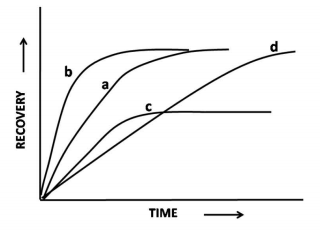 Multiple Choice Questions
Multiple Choice QuestionsFluorescence recovery after photobleaching (FRAP) is a method to estimate the diffusion of molecules in a membrane. Fluorescently labeled molecules such as-
i. a receptor tagged with green fluorescent protein(GFP)
ii. a receptor labeled with GFP which interacts with cytoskeleton.
iii. a labeled lipid.
iv. a labeled protein that binds to the membrane surface
are photobleached and the recovery profiles (a-d) were obtained to estimate their diffusion coefficients.
The following data were obtained:

Which one of the combinations is correct?
a - i; b - ii
b - iii; a - iv
c - iii; d - iv
d - ii; b - i
Rotenone is an inhibitor of the electron transport chain. The addition of rotenone to cells results in which of the following?
Generation of mitochondrial reactive oxygen species and block in ATP generation.
Block in ATP generation but no generation of reactive oxygen species.
Generation of reactive oxygen species but no block in ATP generation.
Permeabilization of the inner membrane to compounds that are usually not able to traverse the membrane.
Metachromatic leukodystrophy (MLD) is caused by a deficiency of arylsulfatase A and affects the CNS. MLD is
a lysosomal storage disorder
a disease due to dysfunctional mitochondria.
caused by loss of the myelin sheath
caused by a defect in proteins of the nuclear envelope
Which one of the following statements is NOT true?
Beta-oxidation of long chain fatty acids occurs in mitochondria.
Fatty acid biosynthesis occurs in peroxisomes.
Peroxisomes utilize H2O2 to oxidize a variety of substrates.
Peroxisomes import their repertoire of proteins using sorting signals.
Which one of the following pairs is NOT matched correctly?
Glycocalyx - adherence
Fimbriae - motility
Pili - conjugation
Peptidoglycan - cell wall
Filtration slits are formed by
podocytes
endothelial cells of capillary
mesangial cells
Lacis cells
Which one of the following vitamins is NOT absorbed in the small intestine by Na+-co-transporters?
Thiamine
Riboflavin
Folic acid
Ascorbic acid
A lac- culture of E. coli was mutagenized. On what media would one spread the mutagenized to select for lac+ cells?
Minimal media + lactose
Rich media + lactose
Minimal media + glycerol + IPTG + X-gal
Rich media + IPTG + X-gal
Which of the following is NOT true for the Anammox bacteria?
They convert nitrate and ammonium into dinitrogen.
They are responsible for 30 - 50% of the dinitrogen gas produced in the ocean.
They belong to the bacterial phylum Planctomycetes.
Membranes of these bacteria contain ladderane lipids.
Membrane potential in mitochondria is critical for oxidative phosphorylation and is monitored by
patch clamping
measuring internal sodium ions after lysing the mitochondria.
measuring the distribution of labeled ions across the mitochondrial membrane.
measuring the consumption of ATP.
